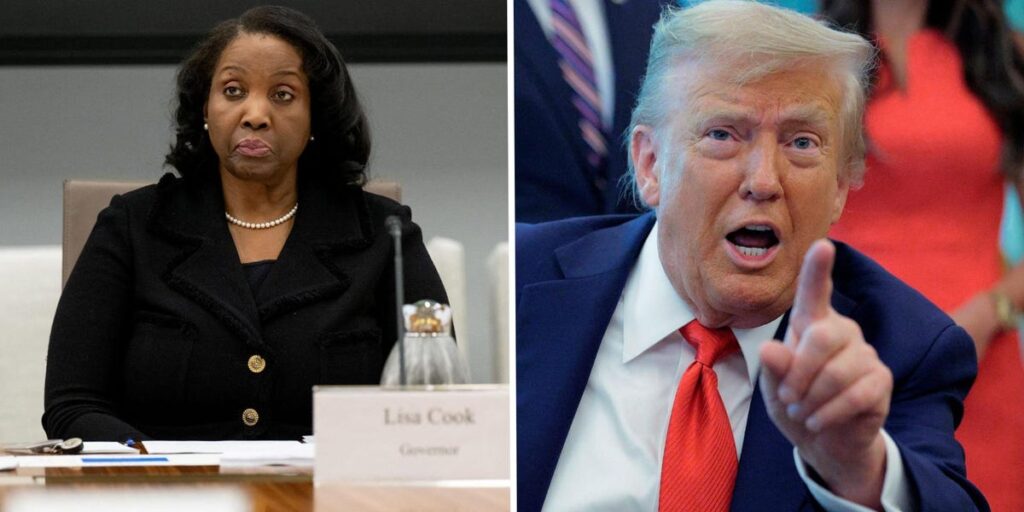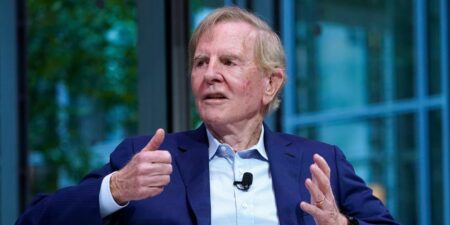President Donald Trump is trying to oust Federal Reserve Gov. Lisa Cook — and if he succeeds, it could mean bad news for your wallet.
While Trump’s closer-term aim is likely to pressure the Fed to lower interest rates, international historical precedent shows that the longer-term result of a president sacking central bank officials could be both higher rates and higher inflation.
In Turkey, for instance, President Tayyip Erdogan fired Naci Agbal, the country’s central bank chief, in 2021. Reuters reported that a hefty interest hike was “the last straw” for Erdogan. In the wake of the firing, the value of Turkey’s lira tumbled, and inflation spiked.
In 2010, a similar showdown occurred in Argentina, when President Cristina Fernández de Kirchner attempted to fire central bank president Martín Redrado over his refusal to release reserve funds to pay down international debt. Inflation spiked in the country, even as the government reportedly underreported rates of price hikes.
“You look at Turkey, where, if you are introducing interest rate movements that shake credibility in the central bank, but then also ignore the actual economic conditions that we are in, these tend to go poorly overall,” said Alex Jacquez, the chief of policy and advocacy at the left-leaning Groundwork Collaborative and a former economic advisor in the Biden administration.
In recent months, the US economy has shown signs of slowing down as tariffs have begun to push up inflation and the job market has stagnated. Fed Chair Jerome Powell signalled that an interest rate cut could happen in September in an attempt to fuel the economy.
“For now, as far as the average folks outside the beltway are concerned, this is all inside baseball,” Steve Kamin, a senior fellow at the right-leaning American Enterprise Institute and former director of the Division of International Finance at the Federal Reserve Board, said. “But in the longer term, if the Fed loses its independence, and if we become a more inflationary economy,” investors might require extra compensation for lending to the US government — aka higher interest rates.
“That will make it more expensive to buy houses,” Kamin said. “It’ll make it more expensive to invest in factories, and that will slow down the economy, and that will hurt the average person.”
The Fed’s independence helps it maintain the trust that it will manage inflation and the job market
One of the Fed’s most important jobs is managing inflation expectations; if consumers and investors expect higher inflation in the future, it can cause a self-fulfilling prophecy as businesses begin pre-emptively raising prices and workers start asking for heftier wage increases.
A less-independent central bank might struggle to credibly contain those expectations. Powell referenced the threat of that kind of spiral during his Jackson Hole speech last week, warning “we cannot take the stability of inflation expectations for granted.”
Of course, this scenario is far from certain. Cook’s lawyer has said they plan to file a lawsuit, following a letter Trump posted to Truth Social that said he was removing Cook effective immediately, citing allegations regarding mortgages Cook held on two different properties. The White House and Cook’s counsel did not respond to a request for comment from Business Insider.
The move comes as Trump circles the country’s central bank and pushes for cuts to interest rates. The president has called Powell a “stubborn MORON” for holding rates steady. As part of the ongoing feud, Trump has reportedly eyed firing Powell, and has already assembled a shortlist of candidates to replace him once his term expires in May.
“It’ll be interesting to see how this develops; exactly who the president’s thinking of to replace Powell, to replace Cook, to see what their broader philosophy is,” Richard Stern, the director of the Center for the Federal Budget at the right-leaning Heritage Foundation, said. “And our hesitation at the moment is I think if you cut rates, you’re probably just as likely as not to just get more inflation.”
Indeed, even if Trump does succeed in ousting Cook, it’s not guaranteed that an analogous situation would play out in the US; Argentina and Turkey had much weaker economies and shakier political structures than America. Jacquez said that if these moves were made in an emerging market, there would likely be significant investor distress; the markets’ reaction has been tame so far because of how robust the US financial system is.
But cutting rates in the US too hard and too early — especially when inflationary pressures like a still-robust labor market and tariffs linger — could lead to a resurgence of price hikes.
Already, there’s been some modest economic fallout from Trump’s move — and that might only continue.
“The dollar has weakened, which is taking purchasing power out of your pocket mechanically, and we’ve seen the 30-year treasury rise, so that means more expensive mortgages,” Jacquez said. He said it’s a “frog boiling in the water moment” for the market.
“They have been desensitized to everything Trump has done, but there will come, I believe, a tipping point here.”
Read the full article here
















